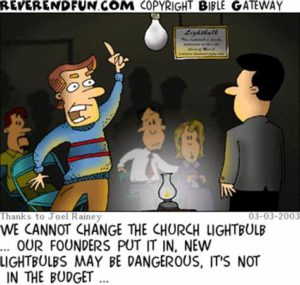The Local Association and the Local Pastor: Make it A Dynamic Duo
This past summer, my husband and I were on a mission trip to California. We were speaking with a replant pastor there and were telling him how surprised we were that their local association listed churches for sale on their website. We were heartbroken that these churches weren’t being replanted or revitalized. Instead, the association was selling them for commercial property to the highest bidder. “That doesn’t surprise me,” he said. “We have spent the past five years trying to help with replanting and planting churches in this area, but the association hasn’t done anything. They haven’t invested time, money, or resources. It seems like the association doesn’t care.”
We were stunned.
But as we talked about this at the base camp that night, we realized that we had heard those same sentiments over 15 years ago from a different pastor in a completely different context. We started our ministry journey in 2007, and at that time, we asked the youth pastor at the church we served in what the local association did to assist pastors in the area. “I couldn’t tell you,” he said. “I’m not even sure who leads it. We haven’t heard from them since the last pastor left several years ago.” Again, we were stunned.
These are extreme examples and are not the norm for most associations and pastors. The vast majority of local associations have leaders who are working alongside the churches in their area and are committed to replanting and revitalizing dying churches. But for some of our replant pastors, this extreme is the unfortunate, heartbreaking context in which they find themselves. How can we create a partnership that thrives and flourishes? What separates the associations and pastors who have an amazing partnership and those who, unfortunately, don’t?
This week on the podcast, JimBo and Bob discussed how associational leaders can be partners in the gritty and glorious work of replanting dying churches. They identified the “Seven C’s” of church renewal for local AMS leaders (Associational Mission Strategist, formerly DOM, Director of Missions) and their pastors to navigate the complex oceans of church health.
What Does Success Look Like?
The very first “C” is the most important. Without it, everything else lacks clear direction. Our first “C” is this: Correctly define success.
What does a “successful” church look like? If your association is celebrating accomplishments and applauding “success,” what metric are they using? Pastors and AMS leaders alike may be tempted to base success on numerical attendance. But consider these statistics:
- A “normative” size church is a church with less than 199 gathered in worship.
- 91% of all SBC churches have less than 200 gathered in worship on any given Sunday, and 79% have less than 100.
- Out of all the churches in the SBC today, less than 90 report an attendance of over 2,000.
Mark Clifton defines success at a church this way: A culture of making disciples that make disciples that in turn make the community noticeably better.
When we base success on the number of attendees on Sunday morning, we are like the couple who goes on a long road trip without deciding who is navigating: We may get somewhere eventually, but we’re going to miss opportunities along the way and we may end up with some hurt feelings before we get there.
If we aren’t correctly identifying what success looks like, we will miss the opportunity to celebrate God’s faithfulness in churches that are making disciples and positively impacting their communities. We will look at the church running large numbers and assume that God is doing great work there but will fail to look at the small church that has increased their giving to missions and has built a discipleship program from scratch.
If we fail to define success correctly, we also run the risk of alienating our partnering churches by making them feel insignificant. Our churches will feel overlooked and unappreciated, and their pastors will feel unsupported and alone, a recipe for burnout and frustration.
An Association of Collaboration

Our next three “Cs” all work together, and that’s fitting because they call us to… All work together!
As an AMS, the networking capabilities are practically built-in. An AMS has access to one thing many pastors don’t have… Other pastors! Too often, pastors forget that we are all in this glorious calling together. We get consumed with a spirit of competition between churches. But the church down the street is not our competition– they are our colaborers in Christ!
While Southern Baptist churches are autonomous and make their own decisions, AMSs have the unique opportunity to encourage pastors to shift from a competitive mindset to a collaborative one by implementing three words: Cooperation, cohorts, and callings.
An AMS can connect a church with resources to one that is lacking them. AMSs should be continually looking for opportunities to foster relationships between churches, not just pastors. Is there a church with an exceptional Children’s Ministry? Parter their team with one that is just starting to grow their kid’s area. Is there a church where discipleship is taking off and people are growing in their faith? Pair someone from that church to teach the pathway to the church that is implementing a program.
When churches cooperate together, the church up the street stops being an enemy of growth and starts being a friend in health. When resources are shared between churches, each church learns to trust and rely on the other, resulting in a much easier transition if one begins to decline and needs to look at an adoption or fostering process. One area where this is happening successfully is the Lexington Baptist Association in South Carolina, led by Johnny Rumbaugh. Johnny has worked with many churches in his association and others by offering a collaborative process by using transitional pastors. You can hear more about his work on this episode of the Replant Bootcamp podcast.)
Cohorts are another great way for AMSs to facilitate collaboration between churches. We often use the phrase, “Don’t pastor alone.” This phrase is a key component for First Coast Churches, an association of churches in Jacksonville, Florida where the partnership between pastors and the association is strong and vibrant. We don’t use this phrase because we want every church to have multiple pastors on staff. We use it because when the storms of life hit, and they will, you NEED other pastors.
Cohorts are small groups in which pastors can get together in a safe environment to talk about their struggles, their burdens, and to celebrate their “wins” together. As an AMS, facilitating those discussions and providing a space for them can make all the difference for pastors who are struggling and on the verge of quitting. You can engineer a bridge that brings pastors together when the waters get deep.
Another way AMSs can help create a collaboration of pastors is to “call out the called,” by assisting churches to create residency programs. Small churches are a great place for men who have been called to the ministry to begin serving in that capacity. Not only are you preparing them for ministry in a normative church, but the church itself benefits by having someone share the work.
AMSs can build a pipeline of pastors who are willing and ready to train others, hopefully with a variety of different gifts. As JimBo stated on the podcast, exposure to pastors and leaders with different gifts allows you to expand your learning and your experience. By building a residency program that utilizes multiple churches and multiple pastors, the association has now not only bridged a gap between pastors but has also given young men the opportunity to serve and to lead in the local church, especially by using these young men for pulpit supply. In Charlotte, North Carolina, Bob Lowman, at the Metrolina Baptist Association has worked alongside pastors in his area to form the City Residency Project to train and equip pastors who are called into ministry. Bob says, “We’re better together. The more we can come together and make this kind of effort, the more I believe we’ll see multiplication happen instead of addition.”
An Association of Comfort
There are going to be times when an AMS will need to provide comfort to a church in their area. Consulting and crisis intervention are the next two “Cs.” When an AMS learns that a church in their area is struggling, he can often provide a powerful resource to help… He can provide himself!
One of the hardest parts of church revitalization and replanting is that churches don’t often realize they’re sick until they’re dying. Churches need to have someone who can help them accurately diagnose their condition and get them the right treatment. When an AMS learns that a pastor is leaving his church, the AMS can offer consulting to that church on their pastor search committee, asking them good questions to help them get a clear picture of their health. Not every church will accept this help, but for those who do, the advice and expertise of their local AMS can be invaluable!
Some churches in an association will face a crisis (or many crises)– in those difficult times, having an AMS who can help them walk through their next steps is critical. The AMS can provide comfort to the church AND the pastor as they navigate exhausting and complicated situations. The role of the AMS and the association is one of encouragement and reassurance that God has not forgotten them.
Celebrating a Beautiful Partnership
I began by telling two stories of unsuccessful and discouraging partnerships between local associations and the pastors they led. Those stories are heartbreaking because everyone in them is discouraged and is missing out on a “match made in Heaven.”
I don’t mean that lightly– truly the partnership between an AMS and a pastor can be God-ordained and God-sent. I have seen it to be true in my own life. When we went through our biggest struggle in ministry– one that had us questioning the very call to pastoring and made us feel like quitting– it was our friends and partners in ministry who pulled us back from the ledge. Our friends were fellow pastors we met through cohorts and collaborations that were created within our local association. The partnership we had with the local AMS reminded us that we had a network of relationships that supported us and kept us from walking away. And in that time, our replant truly began to flourish. If we had walked away we would have missed out on something incredible.
Ecclesiastes 4:9-12 states, “Two are better than one because they have a good reward for their toil. For if they fall, one will lift up his fellow. But woe to him who is alone when he falls and has not another to lift him up! Again, if two lie together, they keep warm, but how can one keep warm alone? And though a man might prevail against one who is alone, two will withstand him—a threefold cord is not quickly broken.”
If you are an AMS, you likely have stories of great success where you have seen churches brought back to health through all of the efforts mentioned above. When you have those stories, celebrate them! Talk about cohorts that are developing leaders from leaders. Talk about the pastoral pipeline that offered a struggling church new hope with a new pastor. Bring pastors to your annual meeting to speak on a panel about the value of collaboration. Have church members talk about the growth they experienced from joining another church in ministry. These success stories are your testimony to the work that God is doing in and through your association and you! As a ground-level partner in church health, your local knowledge and expertise are often the key to ensuring we all navigate these “Seven Cs” of church revitalization even in the most turbulent waters!
Resources:
One of the best resources for AMS leaders regarding replanting, renewal, and church health is the Annual AMS Lab in Atlanta. This event will be held February 19th and 20th in Atlanta, Georgia. We will update you with the speakers and registration as it opens!
We also have the Partnership Profile Tool and the Associational Replanting Guide as tools that you can use to assist you as you partner with replant churches in your area.
And as always, the Replant Team is here to assist you! Leave us a comment and let us know how we can help you in this gritty and glorious work!






